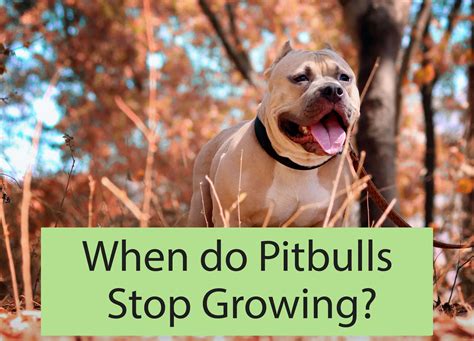As a dog owner, it's essential to understand the growth patterns of your furry friend, especially if you have a Pitbull. Knowing when Pitbulls stop growing can help you anticipate their adult size, plan for their nutrition and exercise needs, and ensure you provide the best possible care. In this article, we'll explore the growth stages of Pitbulls, factors that influence their growth, and when they typically reach their full size.
Growth Stages of Pitbulls
Pitbulls, like all dogs, go through various growth stages. Understanding these stages can help you identify when your Pitbull is likely to stop growing.
- Neonatal Stage (0-2 weeks): During this stage, Pitbull puppies rely on their mother's milk for nutrition and grow rapidly.
- Transition Stage (2-4 weeks): Puppies start to transition from milk to solid food and continue to grow rapidly.
- Socialization Stage (4-12 weeks): Puppies learn social skills, and their growth rate slows down slightly.
- Juvenile Stage (3-6 months): Pitbulls continue to grow rapidly, and their adult teeth start to come in.
- Adolescent Stage (6-12 months): Growth slows down, and Pitbulls start to develop muscle mass and refine their adult features.
- Adulthood (1-2 years): Pitbulls reach their full height and weight, and their growth rate slows down significantly.
Factors That Influence Growth
Several factors can influence a Pitbull's growth rate and adult size. These include:
- Genetics: A Pitbull's genetic makeup plays a significant role in determining their adult size.
- Nutrition: A balanced diet that meets a Pitbull's nutritional needs is essential for healthy growth.
- Exercise: Regular exercise can help promote healthy growth and development.
- Health: Certain health issues, such as hypothyroidism, can affect a Pitbull's growth rate.
When Do Pitbulls Stop Growing?
On average, Pitbulls stop growing between 12 to 18 months of age. However, some Pitbulls may continue to grow until they are 2 years old. Factors such as genetics, nutrition, and health can influence a Pitbull's growth rate and adult size.
Here's a rough estimate of a Pitbull's growth pattern:
- Weight: Pitbulls typically reach 75% of their adult weight by 6-9 months of age and 90% by 12-18 months of age.
- Height: Pitbulls typically reach their full height by 12-18 months of age.
Tips for Promoting Healthy Growth
To ensure your Pitbull grows into a healthy and strong adult dog, follow these tips:
- Feed a balanced diet: Provide a high-quality dog food that meets your Pitbull's nutritional needs.
- Exercise regularly: Engage your Pitbull in regular exercise, such as walks and playtime, to promote healthy growth and development.
- Monitor health: Regular veterinary check-ups can help identify any health issues that may affect your Pitbull's growth.
- Provide adequate rest: Ensure your Pitbull gets enough rest and sleep to support healthy growth and development.

Gallery of Pitbull Growth Stages






FAQs
When do Pitbulls stop growing?
+Pitbulls typically stop growing between 12 to 18 months of age.
What factors influence a Pitbull's growth rate?
+Genetics, nutrition, exercise, and health are factors that can influence a Pitbull's growth rate.
How can I promote healthy growth in my Pitbull?
+Feed a balanced diet, exercise regularly, monitor health, and provide adequate rest to promote healthy growth in your Pitbull.
By understanding the growth stages of Pitbulls and factors that influence their growth, you can provide the best possible care for your furry friend. Remember, every dog is different, and growth rates can vary. If you have concerns about your Pitbull's growth or health, consult with your veterinarian for personalized advice.
